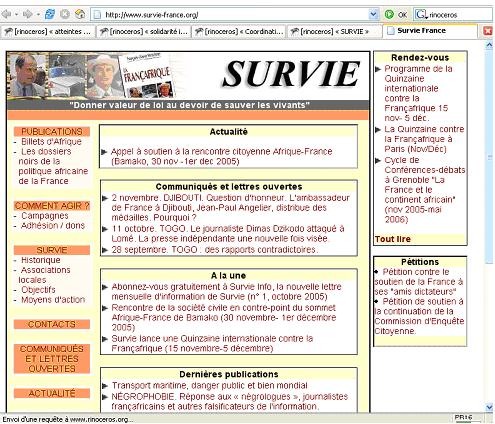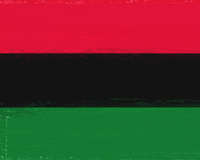++ Françafrique in Brief
 Françafrique in Brief
Françafrique in BriefVon François-Xavier VERSCHAVE, president of Survie from 1995 to 2005
This brief summary is based on an article published in a special dossier of the review Mouvements ("Movements", May 2002), "De la Françafrique à la mafiafrique" ("From Françafrique to mafiafrique"). My main works on the subject are La Françafrique (Stock, 1999), Noir silence ("Black silence") and Noir Chirac ("Black Chirac") (les arènes, 2000 and 2002), and L’envers de la dette ("The other side of the debt", Agone, 2001).
At the beginning of 1994 I coined the term "Françafrique" to describe the tip of the iceberg that is Franco-African relations, and went on to develop this concept in approximately twenty books and special reports. Here, briefly, I shall explain what the term refers to : the secret criminality in the upper echelons of French politics and economy, where a kind of underground Republic is hidden from view.
In 1960, events forced De Gaulle to grant independence to the French colonies of black Africa. This newly-proclaimed international legality was the unsullied tip of the iceberg : France as the best friend of Africa, development and democracy. Meanwhile, Jacques Foccart, "the man in the shadows", was given the task of maintaining dependence, using inevitably illegal, secret and shameful methods. He selected heads of state who were "friends of France" - through war (more than 100 000 civilians massacred in Cameroon from 1956 on ; the Madagascan resistance was broken in 1947 by carnage of a similar magnitude), assassination or electoral fraud. To these guardians of the neo-colonial order, Paris offered a share of the income from raw materials and development aid. Military bases, the CFA franc which could be exchanged in Switzerland, the secret services and the outwardly-innocent businesses acting on their behalf (Elf and numerous supply or "security" companies) completed the system.

And so began forty years of pillage, support for dictatorships, dirty tricks and secret wars - from Biafra to the two Congos. Rwanda, the Comoros, Guinea-Bissau, Liberia, Sierra Leone, Chad, Togo and others will bear the scars for many years to come. Gorged, burnt-out dictators, up to their eyeballs in debt, could no longer promise development, and so they brandished their final weapon, the ethnic scapegoat : "If I prolong my power, by using my clan and playing on ethnic divisions, it’s only to stop your enemies from the other ethnic group replacing me. Let’s exclude them as a preventative measure." We know what happened next, in many countries : a headlong flight into political criminality to consolidate economic criminality.

"Françafrique", also means "France à fric" (1). Over the course of four decades, hundreds of thousands of euros misappropriated from debt, aid, oil, cocoa... or drained through French importing monopolies, have financed French political-business networks (all of them offshoots of the main neo-Gaullist network), shareholders’ dividends, the secret services’ major operations and mercenary expeditions.
Undermined in 1990 by the growth in democracy and "Sovereign national conferences", Françafrique very quickly came up with an arsenal of constitutional manipulation and ballot rigging which enabled it to transform the massive electoral rejection of dictatorships into approval. This double talk (French aid finances the elections ; French networks reverse the results) had a profoundly debilitating effect and resulted in the legitimisation of dictatorships in Togo, Cameroon, Gabon, Chad, Guinea, Mauritania, Djibouti, the Comoros and the Congos...

With "Angolagate" and such people as Pierre Falcone or Arcadi Gaydamak, we are seeing the beginnings of globalised management of the flows of unofficial money come from the predation of raw materials, from debt fraud and from arms-sales commissions - under the "control" of the secret services. The financial layers generated in this way, sheltered in tax havens, are beginning to interconnect ; the networks and treasures of Françafrique are connecting to those of their American, British, Russian, Israeli, Brazilian, etc. counterparts. In short, we are witnessing Françafrique gradually joining a mafiafrique.
At the beginning of 1994 I coined the term "Françafrique" to describe the tip of the iceberg that is Franco-African relations, and went on to develop this concept in approximately twenty books and special reports. Here, briefly, I shall explain what the term refers to : the secret criminality in the upper echelons of French politics and economy, where a kind of underground Republic is hidden from view.
In 1960, events forced De Gaulle to grant independence to the French colonies of black Africa. This newly-proclaimed international legality was the unsullied tip of the iceberg : France as the best friend of Africa, development and democracy. Meanwhile, Jacques Foccart, "the man in the shadows", was given the task of maintaining dependence, using inevitably illegal, secret and shameful methods. He selected heads of state who were "friends of France" - through war (more than 100 000 civilians massacred in Cameroon from 1956 on ; the Madagascan resistance was broken in 1947 by carnage of a similar magnitude), assassination or electoral fraud. To these guardians of the neo-colonial order, Paris offered a share of the income from raw materials and development aid. Military bases, the CFA franc which could be exchanged in Switzerland, the secret services and the outwardly-innocent businesses acting on their behalf (Elf and numerous supply or "security" companies) completed the system.

And so began forty years of pillage, support for dictatorships, dirty tricks and secret wars - from Biafra to the two Congos. Rwanda, the Comoros, Guinea-Bissau, Liberia, Sierra Leone, Chad, Togo and others will bear the scars for many years to come. Gorged, burnt-out dictators, up to their eyeballs in debt, could no longer promise development, and so they brandished their final weapon, the ethnic scapegoat : "If I prolong my power, by using my clan and playing on ethnic divisions, it’s only to stop your enemies from the other ethnic group replacing me. Let’s exclude them as a preventative measure." We know what happened next, in many countries : a headlong flight into political criminality to consolidate economic criminality.

"Françafrique", also means "France à fric" (1). Over the course of four decades, hundreds of thousands of euros misappropriated from debt, aid, oil, cocoa... or drained through French importing monopolies, have financed French political-business networks (all of them offshoots of the main neo-Gaullist network), shareholders’ dividends, the secret services’ major operations and mercenary expeditions.
Undermined in 1990 by the growth in democracy and "Sovereign national conferences", Françafrique very quickly came up with an arsenal of constitutional manipulation and ballot rigging which enabled it to transform the massive electoral rejection of dictatorships into approval. This double talk (French aid finances the elections ; French networks reverse the results) had a profoundly debilitating effect and resulted in the legitimisation of dictatorships in Togo, Cameroon, Gabon, Chad, Guinea, Mauritania, Djibouti, the Comoros and the Congos...
With "Angolagate" and such people as Pierre Falcone or Arcadi Gaydamak, we are seeing the beginnings of globalised management of the flows of unofficial money come from the predation of raw materials, from debt fraud and from arms-sales commissions - under the "control" of the secret services. The financial layers generated in this way, sheltered in tax havens, are beginning to interconnect ; the networks and treasures of Françafrique are connecting to those of their American, British, Russian, Israeli, Brazilian, etc. counterparts. In short, we are witnessing Françafrique gradually joining a mafiafrique.
François-Xavier Verschave
(1) "Fric" means "cash".
 WHO ARE SURVIE ?
WHO ARE SURVIE ?Survie is a non-profit association which undertakes public-awareness campaigns and lobbies citizens and politicians for a reform of North-South relations and French policy in Africa.
It bases its activities on the right of every person to lobby their elected representative and to demand genuine control of political decisions in all domains.
The association has 1800 members and 21 local groups which lead its campaigns throughout France.
The association’s President is Odile Biyidi-Awala.
Survie’s commitment is based on one fact : Developmental problems and poverty in the countries of the Southern hemisphere are caused first and foremost by political decisions. It is therefore in the political domain that action must be taken.

0 Comments:
Kommentar veröffentlichen
<< Home